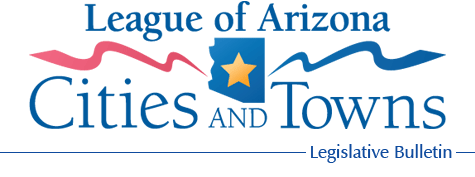
|
|
|
|
Legislative OverviewThe legislature adjourned at 5:45 a.m. on Saturday, May 7, 2016. The last day was frequented by stops and starts but members also processed a large number of bills. Between April 29th and the end of session, the legislature sent Governor Ducey over 200 pieces of legislation. Once the session is over the governor has 10 days to sign, veto or let a bill become law without his signature. As of this writing he has signed 245 and vetoed 9.In this issue we will only write about a few of high profile bills. Within the next few weeks we will publish the New Laws Report, where we will provide more detail on successful legislation. CensusAt approximately 3 a.m. Saturday morning, HB2483, municipal population estimates; use passed the Senate by a vote of 28-0 and was sent back to the House for eventual transmittal to the governor's office. This bill states that cities and towns will use the U.S. Census Bureau's annual population estimates for the period between the decennial censuses. This will result in more accurate distribution of shared revenues. This bill was a League Resolution.Community Facilities DistrictsHB2568, community facilities district; formation; governance describes a new process for formation of one of these districts where the land in question is 600 acres or more. The governing board of these new districts also has a majority of private-sector individuals as opposed to city elected officials. Initially the bill failed on its Final Read in the House, but a member who voted on the prevailing side brought it back for reconsideration and it passed by one vote. Fortunately, Governor Ducey vetoed the measure, saying he sought to protect taxpayers. We thank the Governor for this action.Online LodgingSB1350, online lodging; administration; definitions, creates a new State TPT classification for businesses to voluntarily pay the standard state and local Hotel and Transient Lodging TPT on the business of operating an online lodging marketplace (OLM) such as Airbnb, limited to transactions that do NOT include Class One property (hotels, resorts, etc.) Anyone in this field can enter into an agreement with DOR to collect on all transactions they handle on their platform, while the property owners in all cases remain liable for being licensed and filing their own tax return each month, taking a deduction for any amounts paid by the OLM on their behalf. The bill prohibits municipalities from banning this type of short-term housing rental, but provides authority for cities to deal with nuisance properties in the same manner they would handle similar issues involving an owner-occupied or residential rental property. The bill also requires DOR to create an electronic means not later than December 2017 for property managers of residential rental properties to file a single tax return that includes all the detailed owner information (owner license number) along with the gross receipts, deductions and tax due separately stated by each business location (owner's location numbers). Finally, the bill establishes a Hospitalities Studies Scholarship Fund for use at any State university, and creates a joint legislative study committee to consider current State and local laws and regulations on transient lodging businesses. Sponsored by Senator Debbie Lesko (R - Peoria), the final language is the result of extensive successful negotiations by the League with the Senator and other key members of the Legislature, several industry representatives from many different business models, the DOR and the Governor's office. We greatly appreciated the open dialogue amongst all interested parties that resulted in the final language, and we are very pleased the approved version addressed nearly all of our major concerns. However, given the preemption against local control regarding prohibition of this activity, the League remained officially neutral on this bill. The governor signed the bill on May 12, 2016.Legislative Bill Monitoring(All bills being actively monitored by the League can be found here.) |
|
|
Legislative Bulletin is published by the League of Arizona Cities and Towns. Forward your comments or suggestions to league@azleague.org. |